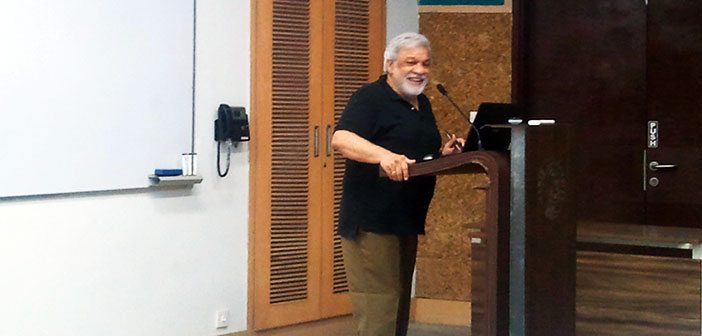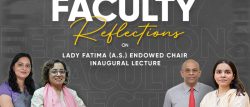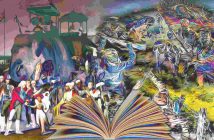The Liberal Core taught at Habib University is made up of seven forms of thought, namely Historical and Social Thought, Philosophical Thought, Language and Expression, Creative Practice, Formal Reasoning, Quantitative Reasoning, Natural Scientific Method and Analysis. Each form of thought is based on teaching students the principles of knowledge creation and absorption, and are locally contextualized to provide students with a shared foundation for understanding historical and conceptual underpinnings of the modern world, along with Pakistan’s position within it. Keeping in lieu with this philosophy, the students of Hikma were visited by esteemed Professor Dr. Charles Amjad-Ali on Tuesday, April 5, sitting in for a guest lecture entitled “Religion and Politics: Paradoxes or Foundational Dialectic”.
Dr. Charles Amjad-Ali addressed the philosophical and ethical foundations of the contemporary discourses of Islamophobia in the West and the persecution of religious minorities in Pakistan. Given that Hikma itself is devised of an expansive world-historical and global view of the region’s heritage pertaining to Islamic thought, its history and traditions, the lecture was well-received by students who engaged with the Professor enthusiastically. During his lecture, Dr. Ali argued that Islamophobia and the consequent persecution of religious minorities in the Muslim Word are inter-related processes and derive from the development of the nation-state in Europe, as well as the uncritical adoption of this model in the global South. He discussed with students the respective notions of majoritarian national and religious identities that also draw on a misreading of European and Islamic history.
In particular, Dr. Ali criticized the European assumptions of the separation between religion and politics, and pointed out that religious and sectarian identity was inscribed deeply into various European national identities in the formative stages of the Protestant Reformation. These religious identities were consolidated in the wake of the Peace of Westphalia which led to ethnic cleansing and mutual exchange of religious communities. In a similar fashion, the fashioning of national identities in countries such as Pakistan and India around dominant religious and sectarian communities derived from a selective reading of Islamic history and misinterpretation of the Sunnah (tradition) of Prophet Muhammad (PBUH) that was used to legitimize the persecution of religious and sectarian minorities in Pakistan.
Dr. Charles Amjad-Ali is the Visiting Professor of Christian Mission and Social Justice at Lutheran Seminary in Chicago, United States. He has held a series of international lectureships reaching back well over a decade. In May 1997 he received the Martin Luther King, Jr. Chair of Justice and Christian Community. Before joining the Luther Seminary, he had lectured at Princeton, Notre Dame, St. Thomas and Temple Universities as well as at Union Theological Seminaries. He has also served on the faculties in South Africa, Sweden, England, Germany, Australia, Japan, and the Philippines. A native citizen of Pakistan, he was ordained as a presbyter of the Church of Pakistan in 1987. He was the director of the Christian Study Center in Rawalpindi, Pakistan, from June 1985 till June 1995 and then for a year the Director of Political Education at the Aurat (Women) Foundation in Pakistan. His numerous publications include Islamophobia (2006) Liberation Ethics (1985) and Passion for Change (1989) as well as two books with Christine Amjad-Ali, And the Spirit Gives Life (1993), and History of the Shariah Act, 1991 (1992). “I Look Toward the Mountain” (1993) is the most recent of many studies edited for a variety of national and international ecumenical agencies.
The guest lecture was arranged for the students of Hikma by Dr. Nauman Naqvi, Director of Habib Liberal Core, in collaboration with Mr. Karamat Ali, Executive Director of Pakistan Institute of Labor Education and Research (PILER). It is part of the deepening cooperation between the School of Arts, Humanities, and Social Sciences at Habib University and the Pakistan Institute of Labor Education and Research.




